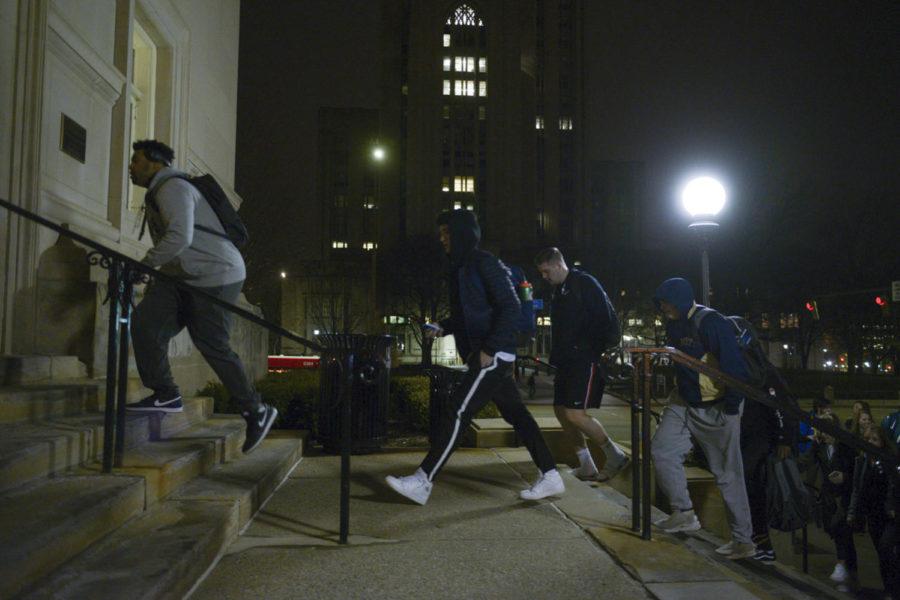Student members of Pitt Athletics and the Pitt community filled the seventh floor auditorium of Alumni Hall Monday night to listen to a talk about sexual assault prevention on campus.
The conversation was led by counselor, educator and self-described “sexologist” Kimberly Dickman. Her visit to Pitt was one of several trips to college campuses meant to educate students about consent, healthy relationships and sexual assault prevention. Dickman, who currently serves as the sexual assault program analyst for the U.S. Air Force, delayed her trip — originally scheduled for November — because her responsibilities as a member of the government. She greeted her audience with an apology.
“I said ‘Sir, it’s Pitt,’ and he said, ‘Sorry, it’s Congress,’” Dickman said about the disappointment she felt after her boss told her to delay her trip.
To loosen up the crowd before a serious discussion about sexual assault, Dickman engaged everyone with a roll call. She instructed the audience to respond to statements that fit them by shouting “Oh, yeah.”
As Dickman listed different student organizations, students rowdily shouted, “Oh, yeah.” But then Dickman connected the roll call to the subject at hand.
“The reason I do this roll call is because your voice on this topic makes a difference,” Dickman said.
For the rest of the talk, Dickman presented information about sexual assault in a lecture-like format. She highlighted how infrequently survivors report sexual assault, using the metaphor of an iceberg to indicate that only the tip of the iceberg represented the reported assaults.
According to a National Sexual Violence Resource Center report, one in five women and one in 16 men are sexually assaulted in college, but more than 90 percent of these incidents go unreported.
“For some of you, you might be a survivor of violence, or someone very close to you, and you might never know,” Dickman said.
To illustrate why people would not want to report an assault, Dickman told the audience to partner up and describe their last consensual sexual experiences in detail. Hearing the audience’s confusion, she stopped the exercise.
“We’re not gonna do this exercise,” Dickman said. “I want you to think about the awkwardness and discomfort that you felt. And that was with me asking about your last sexual experience with consent. Now imagine that it’s not consensual.”
While she stressed the importance of being an open ear to victims of sexual assault, she also talked about the importance of sexual assault prevention by understanding consent.
“[Consent] is kind of like ordering pizza. For those of you who are athletes, a lot of time we talk about bases and sex,” Dickman said. “It’s a dangerous analogy to use because there is competition, there is how far can you go, and there is who wins. But pizza is a conversation. Do you want … sausage? Mushrooms?”
While Dickman told the audience to ask for explicit consent, she had a more nuanced opinion about consent and alcohol.
“Most people will train children and say zero drinks — it’s not ok to drink and have sex,” Dickman said. “But I’m here to say you can have drunk sex, and if we’re living in a world of sexual shame, a lot of people feel like they need alcohol to have sex.”
Emily Horner, a junior psychology student on the women’s volleyball team, said Dickman’s position on alcohol was unusual, but relevant to college campuses.
“That’s just so important. Like how much is too much when drinking?” she said. “You can’t judge somebody’s level, so you can’t understand if they are comfortable in [a sexual] situation because you don’t know them, and you don’t know what their tolerance is.”
Maddy Cavell, a junior also studying psychology, agreed giving consent when alcohol is involved can be a tricky issue. As the risk manager of the Tri Delta sorority, Cavell was concerned with making sure that people in her sorority felt comfortable talking about their experiences with sex.
“The biggest thing I took away from it was just taking the time to tell somebody that, like, if this ever happens to you, I want you to talk to me because I’m here for you and I support you,” Cavell said.
Dickman ended her speech by inspiring the audience to act within their sororities, frats or teams to combat sexual assault.
“We can’t do this without you,” Dickman said. “We can’t stop sexual assault without you. It doesn’t have to be an hour and a half presentation, it’s one comment that you make.”


